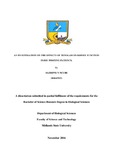Please use this identifier to cite or link to this item:
https://cris.library.msu.ac.zw//handle/11408/2550Full metadata record
| DC Field | Value | Language |
|---|---|---|
| dc.contributor.author | Ncube, Sazisiwe N. | - |
| dc.date.accessioned | 2017-07-06T14:18:14Z | - |
| dc.date.available | 2017-07-06T14:18:14Z | - |
| dc.date.issued | 2016-11 | - |
| dc.identifier.uri | http://hdl.handle.net/11408/2550 | - |
| dc.description.abstract | The study was carried out to determine the effect of Tenolam drug on kidney function in HIV positive patients at Nkayi District Hospital. The study was done from June 2016 to October 2016. This was done by analysing the change in urine protein concentration after the patients were given the drug. A total of thirty individuals were recruited in the study, fifteen females and fifteen males. Age, gender and CD4 counts of the patients were recorded before tenolam administration. Each patient collected their midstream urine samples and the samples were tested for protein concentration using a protein strip. Sample testing was done three times, at baseline, two months on tenolam treatment and four months on tenolam treatment. At baseline all the patients had no protein in their urine and the urine protein concentration had a significant increase from baseline to two months being on Tenolam drug (t-test p=0.00). The urine protein concentration increased slightly from two months and four months after Tenolam administration (t-test p=0.56). There was a significant increase in urine protein concentration from baseline to four months after tenolam administration (t-test p=0.00). The mean protein concentration at two months after tenolam administration was 70cells/µl and the mean change after four months was 120cells/µl. Gender, sex and Tenolam treatment were the risk factors in the study. Gender did not have a significant effect on the urine protein concentration during the study (anova p=0.632). Age had a significant effect on the urine protein concentration (anova p= 0.012) and Tenolam administration had a significant effect on the urine protein concentration (anova p= 0.00). Therefore Tenolam administration causes the urine protein concentration to increase and this indicates that it alters kidney function. | en_US |
| dc.language.iso | en | en_US |
| dc.publisher | Midlands State University | en_US |
| dc.subject | People with HIV | en_US |
| dc.subject | Tenolam drug | en_US |
| dc.title | An investigation on the effects of tenolam on kidney function in HIV positive patients. | en_US |
| item.languageiso639-1 | en | - |
| item.fulltext | With Fulltext | - |
| item.grantfulltext | open | - |
| Appears in Collections: | Bsc Biological Sciences Honours Degree | |
Page view(s)
174
checked on Dec 21, 2025
Download(s)
70
checked on Dec 21, 2025
Google ScholarTM
Check
Items in MSUIR are protected by copyright, with all rights reserved, unless otherwise indicated.




